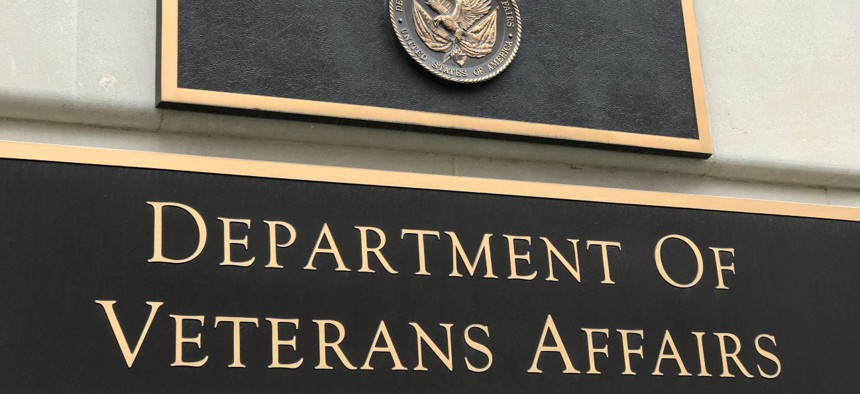
Kiyoshi Tanno / iStock / Getty Images Plus
Biden administration to Congress: Don't give us more authority to fire people
Legal hurdles to already failed approaches would only complicate the disciplinary process, officials say.
The Biden administration on Wednesday forcefully pushed back on efforts to make it easier to fire some federal employees, saying a legislative proposal to do so was unnecessary and a retread of failed ideas.
Veterans Affairs Department officials made their case during a hearing on a new bill from Republican leadership seeking to once again create new pathways to holding federal employees accountable for poor job performance or misbehavior. While the measure has some bipartisan backing, support from the House Veterans' Affairs subcommittee that held the hearing broke down along partisan lines, with only Republicans fighting for it.
The Restore VA Accountability Act (H.R. 4278) would allow the department’s secretary to remove or demote any employees and, for supervisors, eliminate their ability to launch an appeal to the Merit Systems Protection Board, the independent agency designed to hear such cases.
VA Secretary Denis McDonough earlier this year ended the implementation of disciplinary provisions included in the 2017 VA Accountability and Whistleblower Protection Act, citing its repeated defeats in court and elsewhere. The decision marked the second time in the last decade that Congress tried and failed to speed up firing at VA. In 2016, the department announced it would no longer use a 2014 law aimed at making it easier to fire career senior executives after it similarly suffered a series of legal setbacks.
VA said in a statement ahead of the hearing it opposed the legislation. It predicted the measure would once again lead to “extensive litigation and constitutional challenges,” which would create more uncertainty at the department and eventually lead to more disciplinary actions getting overturned. Additionally, VA said further reforms are superfluous.
“We are confident that the authorities currently available to the VA are sufficient to hold employees accountable for misconduct and poor performance,” the department stated. “We do not believe any legislation is necessary right now to ensure accountability.”
Under the new legislation, VA would set up a hastened, internal grievance process for supervisors who wish to appeal a disciplinary action. Following a final determination, employees could then take their case for judicial review, but not to the Merit Systems Protection Board. The measure would reinstate several provisions that were struck down from the 2017 law, such as lowering the evidentiary threshold for upholding firings, blocking judges from challenging the penalty imposed, removing the requirement for "performance improvement plans" from the pre-disciplinary process and applying the system to medical workers in "hybrid" Title 38 positions.
Rondy Waye, VA’s executive director for human capital programs, said the bill would unfairly focus on tens of thousands of low-ranking, hourly employees who serve supervisors. The measure, he added, would make it harder for VA to get employees to take on those roles, as well as to bring in new employees from outside the existing workforce. He also highlighted that VA fires around 5,000 employees per year and it does not require any additional authority to continue doing so.
Rep. Mike Bost, R-Ill., who chairs the House Veterans' Affairs Committee and introduced the legislation, accused his colleagues of having a “short memory” and dooming VA to being stuck with employees who are harming veterans, citing the 2014 wait list scandal that first led to the widespread congressional interest in civil service reforms at the department. He did not address the likelihood that his measure would face the same legal challenges as its predecessors, saying only that he wanted to clarify what Congress is hoping to achieve.
“My bill will make changes and improvements to the 2017 law to make Congress's intent even clearer,” Bost said. “This will all allow the secretary to be able to remove the small percentage—and I say that a small percentage—of employees who are hurting veterans in weeks or months rather than years. We owe it to the hardworking VA employees and our veterans to hold those at the VA not doing the right thing accountable.”
Bost asked VA officials to work with him to address difficulties he said employees have themselves reported having in getting rid of poor performers, adding he would “love to hear your suggestions.”
Waye countered that any delays in removing an employee were not due to a lack of authority and that appeals are a “fundamental part of the process.” He struck a different tone than top officials under the Obama and Trump administrations, when VA leadership—and other agency heads—went to Congress appealing for more firing authority.
Rep. Matt Rosendale, R-Mont., said it was “appalling” that VA was trying to “turn back the clock” on accountability measures.
“Don't tell me that you're doing enough with the previous legislation,” Rosendale said. “You're putting veterans' health at risk.”
Waye stressed VA only stopped using the authority under the 2017 law because various court rulings made it virtually impossible to enforce and the department was worried the new bill would lead to a similar outcome.
Bost’s bill has bipartisan support in the Senate, where Sen. Joe Manchin, D-W.Va., has signed on to companion legislation. Democrats at Wednesday’s hearing, however, unilaterally expressed opposition to the bill, saying the measure would have unintended consequences and unfairly take away key civil service rights.
“Before we advance legislation like this, I feel we need to fully understand how it will impact rank and file employees,” said Rep. Frank Mrvan, D-Ind. “The last thing VA needs is for Congress to create further barriers to recruiting and retaining highly qualified employees.”







